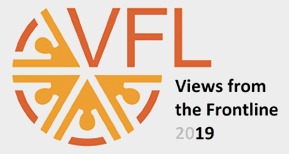
OSVSWA being the National Coordinating Organization (NCO) of Global Network of CSOs for Disaster Reduction (GNDR) is implementing this global study in 4 states in India, they are – Odisha, Bihar, Sikkim and Gujarat.
Views from the Frontline (VFL) 2019 are the largest independent global review of disaster risk reduction at local level. It aims to strengthen the inclusion and collaboration between at- risk people, civil society and governments in the design and implementation of policies and practices to reduce risks and strengthen resilience. This is done by measuring and directly implementing actions to support progress towards achieving an inclusive ‘people-centered’ approach to resilience-building.
All the global development frameworks refer to the importance of including local actors; however, they fail to recognize the importance of monitoring the targets of global frameworks; especially monitoring SFDRR targets. VFL 2019 therefore fills this gap by providing complimentary monitoring, baseline and data to help guide actors to more effectively achieve the targets of the post- 2015 development frameworks, strengthening the accountability of governments, intergovernmental agencies and all other stakeholders to local communities and their resilience priorities.
VFL 2019 is a three-year program of work structured around three components:
• Collection: Local civil society organizations are mobilized to conduct surveys and consultations with local communities, local civil society organizations and the local government authorities, recording their perspectives on risk and resilience. These are aggregated in an open-source database which can be disaggregated by country, community, age, gender, disability and other factors.
• Reflection: Analyzing trends and reflecting on data to draw out key findings about local risk and resilience.
• Action: Actions at the local, national and global level to use the data to inform better resilience-building.
Views from the Frontline 2019 will collect perspectives around three themes:
• Risk Profile: Including their priority threats, consequences, actions and barriers; how losses are changing over time; threats in 10 years’ time
• Inclusive Risk Governance: Including the extent to which communities are included by different actors in assessment, planning, implementation and monitoring risk
• Enabling Environment: Including the extent to which resources, capacities, legislation, leadership, policy coherence and other factors are contributing to the inclusion of local actors in resilience building
It will then support reflection and action at different levels:
• Local: Communities are provided with technical and financial support to use the data to plan and implement much-needed local resilience-building actions.
• National: National multi-stakeholder workshops are organized to identify shared objectives and joint accountability, including designing DRR strategies that are informed by the findings. Toolkits and trainings are provided to civil society organizations to help them jointly advocate for changes in national policy and practice using the VFL data as evidence.
• International: Data and findings will inform global policy-making instruments by feeding into the monitoring of the SFDRR, the Paris Agreement, the Sustainable Development Goals, the World Humanitarian Summit and the Urban Agenda. In particular, it will set baselines of progress on ‘people-centered’ resilience.
For more information, please contact us

